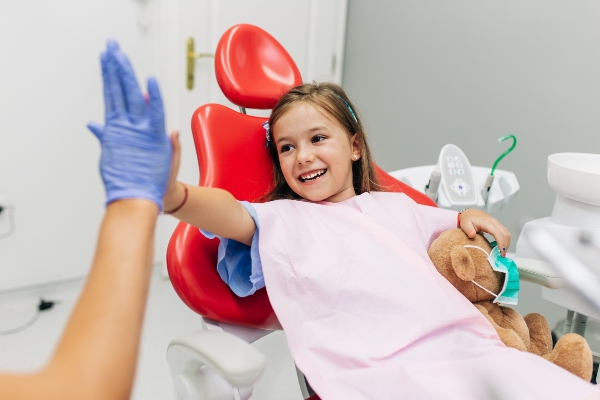Why a Pediatric Dentistry Office Would Recommend Fluoridated Water
 Fluoridated water is part of pediatric dentistry. It is a convenient and easy way to strengthen and protect teeth at an early age. Many areas have fluoridated water, which is a definite advantage. If you want to know why a dentist will likely recommend fluoridated water, here are the details.
Fluoridated water is part of pediatric dentistry. It is a convenient and easy way to strengthen and protect teeth at an early age. Many areas have fluoridated water, which is a definite advantage. If you want to know why a dentist will likely recommend fluoridated water, here are the details.
What is fluoridated water?
Studies show that almost all sources of drinking water have some traces of fluoride. But most of them do not have any effect on one’s dental health. Water fluoridation adds more fluoride to the water. These higher levels of fluoride are enough to fight bacterial acids and strengthen teeth.
Fluoridated water from the tap allows people to drink it and use it for brushing their teeth. Pediatric dentistry emphasizes that consuming this water delivers fluoride to the mouth continuously. The fluoride then bonds with the weakened enamel layer. This can rebuild the lost enamel areas and prevent decay.
Fluoridated water reduces the risk of cavities
Pediatric dentistry always recommends fluoridated water for kids. Research shows that it can prevent dental decay in all ages by at least 25%. It is a good addition to the fluoride-rich dental products and treatments available. Fluoridated water is essential for populations who have a higher risk for dental decay. These are often kids and the elderly. Those who have access to fluoridated water have fewer teeth with cavities than those who do not.
Fluoridated water decreases the need for pediatric dentistry procedures
Fluoridated water can decrease the number of pediatric dentistry treatments a child may need. It also prevents adults from having dentures early. Aside from cavities, dental decay can bring about more adverse effects. Dental malformations, pain, and difficulty focusing can give a child a hard time, especially in school. These issues can lead to more serious conditions like tooth loss or even cancer.
Fluoridated water is natural
Some people believe that fluoride intake is dangerous. This is only true if one takes in significantly large amounts of this element. Taken in small doses, fluoride is harmless. It is often known as nature’s organic dental decay fighter. This element is present in saltwater and freshwater sources. It is also a component of fluorine, which is found in the Earth’s crust.
Natural fluoride is not enough to protect teeth. That is why there is water fluoridation. Adding fluoride to the community water supply is not harmful at all. The levels in the tap are the recommended levels, enough to prevent tooth decay.
Fluoridated water can help save money
Pediatric dentistry professionals say that fluoridated water can improve one’s savings. Children get fewer fillings, and there is almost no need for dental crowns. In case a residential area has no fluoridated water, parents must talk to the attending dentist about it. The need for more fluoride can be filled with oral supplements, fluoride toothpaste, or fluoride mouthwash. Fluoride treatments are also available at the clinic.
Pediatric dentistry always recommends fluoridated water because of its many practical benefits
Living in an area that has fluoridated water has many advantages. The fluoride supplied by tap water nourishes the teeth enough to strengthen and protect them from decay. Studies show that consuming fluoridated water from childhood lowers the risk of getting pediatric dentistry treatments and dentures earlier than necessary. Your dentist can add more fluoride to your child’s teeth if there is a need for it.
Request an appointment or call Nett Pediatric Dentistry & Orthodontics at 623-759-7658 for an appointment in our Phoenix office.
Recent Posts
Regular visits to a pediatric dentist who specializes in young patients are an important part of establishing good oral health practices. Many instances of severe dental conditions in children stem from either a lack of regard for proper hygiene or a lack of knowledge on the proper ways to care for a child's teeth. Check…
Pediatric dental care supports children's health, comfort, and development. Not only does it strive to detect and treat oral health problems early, but it also desensitizes children to dental visits to make each experience more comfortable. This special care and attention can motivate children to take good care of their teeth from a young age.Dental…
Cavity treatment for kids is a chief concern among parents, and for a good reason. Cavities are common in children of all ages. According to the Centers for Disease Control and Prevention, over half of the kids ages 6 to 8 have had at least one cavity in a primary tooth. The good news is…


